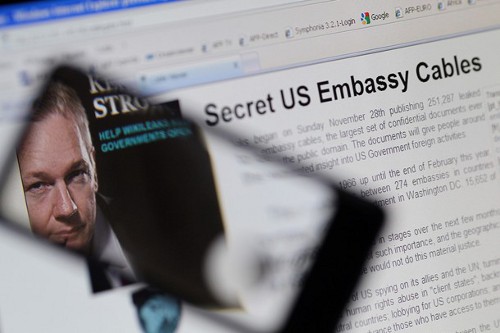
As a career Foreign Service Officer, I guess I should be gratified that various analysts and news outlets have declared, as a result of leaked State Department dispatches, that the U.S. diplomatic corps is dedicated, astute and insightful. However, I think I can speak for the majority of my colleagues when I say that we would have preferred to have remained unsung and underrated.
Because while some may be learning that “Washington is pursuing privately pretty much the policies it has articulated publicly,” our contacts around the world have learned that confiding in U.S. diplomats is risky business. I have sat across the table from many individuals to whom I pledged, with complete confidence, that their comments would be held in strict confidence. I am devastated to think that their trust in me and in my government, might come back to haunt them.
And, I am disappointed that respected journalists and media outlets have, as Christopher Hitchens so aptly put it, “become complicit in Julian Assange’s private decision to try to sabotage U.S. foreign policy.” I know NYT editor Bill Keller and his colleagues don’t see it that way, but I think their justifications for publishing the cables are weak. According to Keller,
[T]he more important reason to publish these articles is that the cables tell the unvarnished story of how the government makes its biggest decisions, thedecisions that cost the country most heavily in lives and money. They shed light on the motivations — and, in some cases, duplicity — of allies on the receivingend of American courtship and foreign aid. They illuminate the diplomacy surrounding two current wars and several countries, like Pakistan and Yemen, where American military involvement is growing. As daunting as it is to publish such material over official objections, it would be presumptuous to conclude thatAmericans have no right to know what is being done in their name.
I would argue that Americans already had that ability, even if they weren’t privy to confidential diplomatic reporting.
As The New Yorker’s George Packer commented, If WikiLeaks “were uncovering crimes, or scandals, or systemic abuses, there would be no question about the overwhelming public interest in these latest revelations. But the WikiLeaks dump contains no My Lais, no black sites, no Abu Ghraibs. The documents simply show State Department officials going about their work over a period of several years.” Packer asks rhetorically whether this is worth the damage the leaks may cause.
As a U.S. diplomat, my answer is an unequivocal “no.”
Susan Ball is a career Foreign Service Officer and a Senior Fellow at the Atlantic Council’s International Security Program. Photo Credit: Getty Images.
Image: Assange500.jpg
